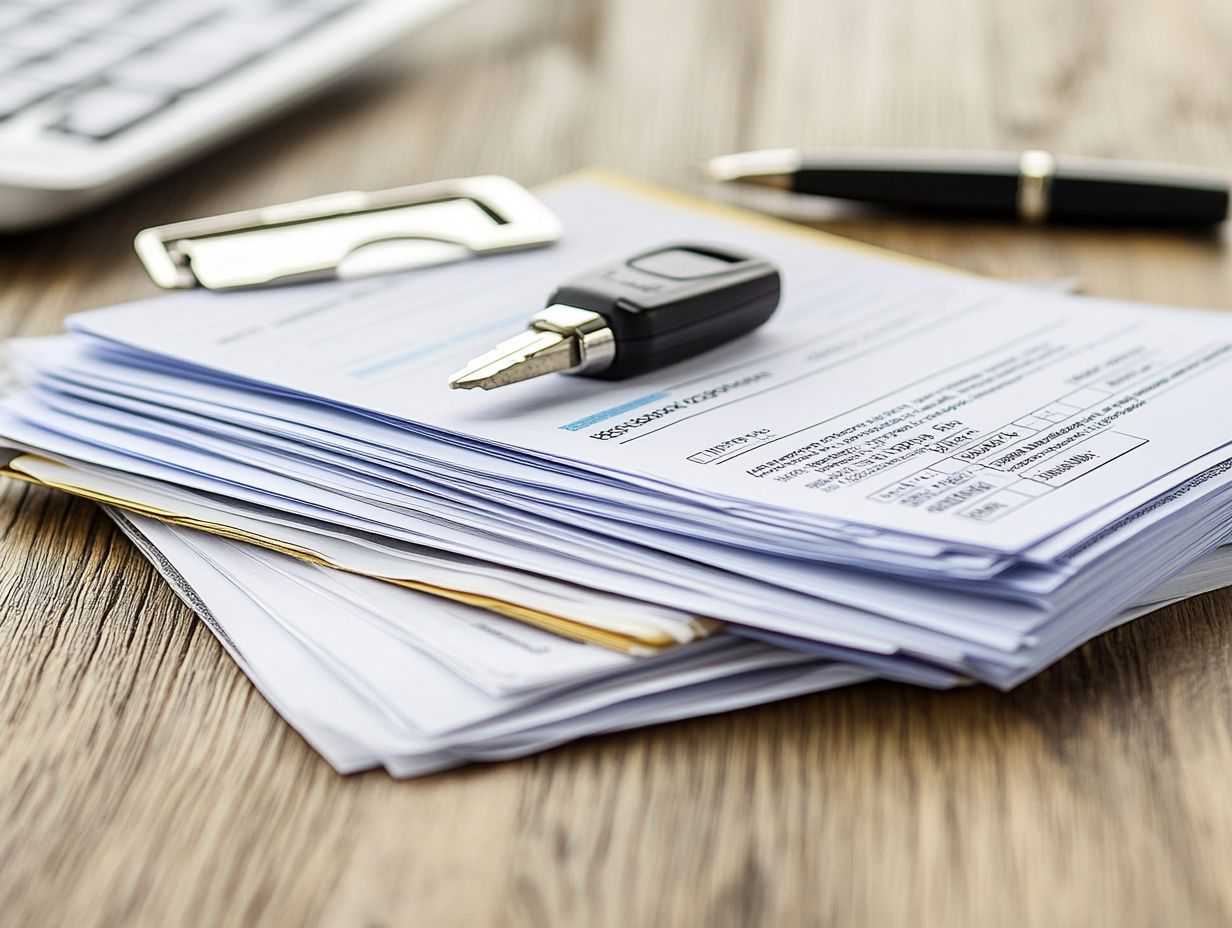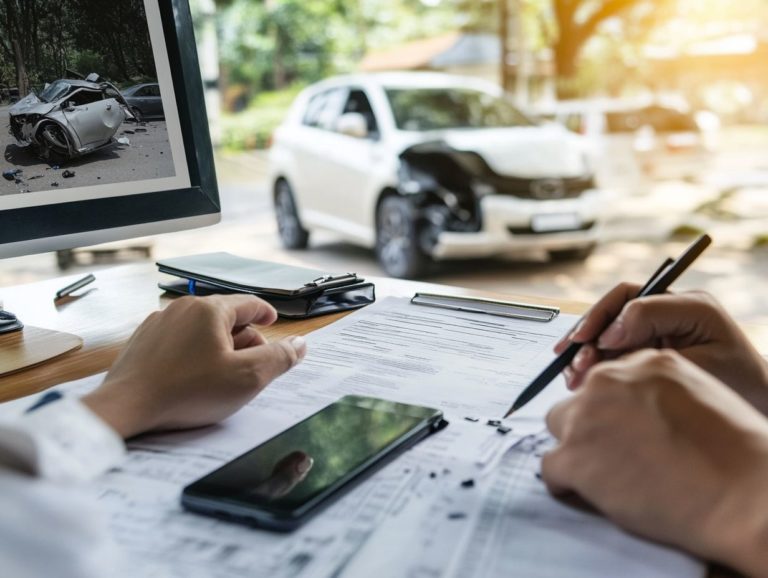5 Essential Documents for Buying Used Cars
Buying a used car can be both exhilarating and daunting. To make a wise investment, understand the key documents involved.
Each document, from the vehicle history report to maintenance records, safeguards your purchase. This article guides you through five key documents.
You will learn what to look for in each document. Discover the risks of overlooking them.
Equip yourself with this knowledge. Navigate the used car market with confidence!
Contents
- Key Takeaways:
- 1. Vehicle History Report
- 2. Bill of Sale
- 3. Title and Registration
- 4. Warranty Information
- 5. Maintenance Records
- What Should Be Included in a Vehicle History Report?
- How Can One Obtain a Vehicle History Report?
- What Should Be Included in a Bill of Sale?
- What Is the Importance of Having a Clean Title and Registration?
- What Should One Look for in Warranty Information?
- Why Are Maintenance Records Important When Buying a Used Car?
- What Other Documents Should Be Considered When Buying a Used Car?
- What Are the Risks of Not Having These Essential Documents?
- How Can One Ensure They Are Getting a Good Deal When Buying a Used Car?
- What Are Some Common Mistakes to Avoid When Buying a Used Car?
- Is It Necessary to Have a Lawyer Review These Documents?
- Frequently Asked Questions
- What are the 5 essential documents needed when buying a used car?
- Why is the vehicle’s title an important document when buying a used car?
- What information should be included in the bill of sale for a used car?
- How can a vehicle history report help when buying a used car?
- Why are maintenance records important to have when purchasing a used car?
- Should I review the warranty documents before buying a used car?
Key Takeaways:

- A vehicle history report helps you understand a car’s past and potential issues.
- The bill of sale serves as legal proof of purchase and should include the purchase price and vehicle identification number.
- A clean title and registration are necessary for transferring ownership and avoiding legal problems.
1. Vehicle History Report
A comprehensive vehicle history report is essential when you’re considering the purchase of a used car. It reveals crucial insights that could save you from a bad deal!
This report details the vehicle’s past ownership, accident history, title status, and other critical factors that could impact its safety and reliability.
Understanding whether the vehicle boasts a clean title which means the car has not been in major accidents or a salvage title indicating it has can significantly influence its value and legal standing on the road.
Reputable sources like the National Motor Vehicle Title Information System and the National Insurance Crime Bureau offer transparency into the vehicle’s background, helping you make a more informed choice.
Grasping a vehicle’s past can spare you from costly mistakes like buying a car that s been in serious accidents or one with a tampered odometer. Statistics reveal that nearly one in four cars on the road has some form of title issue, making vehicle history reports even more essential.
In California, many vehicles involved in accidents carry hidden damages that sellers conveniently omit. Meanwhile, New York has seen its fair share of odometer rollbacks.
By obtaining a vehicle history report, you can protect yourself against these common pitfalls, ensuring that your decision is well-informed and secure.
2. Bill of Sale
The bill of sale is an essential document when purchasing a used car, serving as the legal record of your transaction. It details crucial aspects of the sale, such as the purchase price, the vehicle’s condition, and any warranties or guarantees provided by the seller. Additionally, it’s important to know what to check before buying a used car to ensure you’re making a wise investment.
Make sure it includes key elements, like the vehicle identification number (VIN), which uniquely identifies the car. You’ll also want to have comprehensive information about both you and the seller to establish clear ownership, especially when considering tips for buying a used car from a dealer.
It s important to document any specific terms of the sale, including payment methods and potential contingencies.
Retaining a copy of this document is not merely a good practice; it serves as protection for everyone involved. In case of disputes, it stands as proof that ensures all legal obligations and financial responsibilities are clearly defined and understood.
3. Title and Registration
Understanding the nuances of title transfer and vehicle registration is essential for you as a used car buyer. It ensures compliance with DMV requirements and protects your ownership rights. This knowledge helps you steer clear of potential legal issues related to debts associated with the title or emissions inspection failures.
In many states, having a clean title significantly impacts the registration process and the associated car sales tax. Therefore, it’s crucial to be informed and prepared.
As you navigate this intricate process, start by gathering the necessary documents, including the bill of sale and the current title. In Connecticut, you ll want to fill out the Application for a Certificate of Title, alongside a form documenting the vehicle s mileage history. In Massachusetts, ensure that you submit a completed registration application along with the title transfer fee.
Always check for outstanding liens this could save you from future headaches! It s vital to resolve any issues before moving forward, as a dirty title can lead to unnecessary delays. Be cautious of potential pitfalls, such as missing registration deadlines or failing to provide adequate proof of insurance; these could complicate the transfer process and ultimately affect your vehicle ownership experience.
4. Warranty Information
When you’re purchasing a used car, understanding warranty details is essential. It can shield you from unforeseen issues that might crop up after the sale, providing you with peace of mind and clarity regarding legal obligations and coverage limitations.
Various types of warranties can come into play here. You might encounter limited warranties, which cover specific components, or extended warranties that offer broader protection over a longer span of time. These warranties can vary significantly by dealership or manufacturer, shaping what is covered and the duration of that coverage.
It s crucial to meticulously review the warranty terms before finalizing your purchase, as these details can profoundly influence your overall ownership experience. Understanding how a warranty works with your insurance policy helps you know what is covered.
This knowledge enables you to recognize both coverage potentials and gaps, ultimately enhancing your confidence in making a well-informed decision.
5. Maintenance Records
Maintenance records are essential for checking how well the car works. They provide you with valuable insights into how well the vehicle has been cared for throughout its life, ultimately helping you predict future maintenance needs.
Beyond giving you peace of mind about the car’s history, these records can significantly enhance your negotiating position. Imagine discovering detailed documentation of routine services, such as:
- Timely oil changes
- Tire rotations every 5,000 miles
- Major repairs, like a replaced transmission
These entries show that the previous owner was diligent in caring for the car and highlight the investments made in maintaining its functionality. Having complete maintenance records? That s your ticket to negotiating a better price!
What Should Be Included in a Vehicle History Report?

A vehicle history report should encompass several essential elements that give you a comprehensive view of a used car’s past. Look for details like mileage history, previous accidents, title transfer history, and any reported liens against the title. Each of these components is crucial in guiding your decision-making process.
For example, accurate mileage readings are vital; discrepancies can raise red flags about potential issues or even fraud, suggesting that the vehicle may have had its mileage rolled back. Knowing about past accidents can help you gauge whether the car has endured significant damage that could impact its safety and longevity.
Title transfer history and any reported liens provide valuable insights into the vehicle’s ownership and financial standing, ensuring you don t unknowingly take on hidden liabilities.
By fully understanding these elements, you enable yourself to make informed choices, ultimately protecting your investment. Additionally, consider following 5 tips for buying a used car from a private seller to enhance your experience. Always gather all necessary documents before heading to the dealership to ensure a smooth purchase.
How Can One Obtain a Vehicle History Report?
Obtaining a vehicle history report is a straightforward process that you can navigate through various reputable online services. One reliable option is the National Motor Vehicle Title Information System, which provides valuable information regarding a vehicle’s past ownership and accident history.
To get started, simply visit the official website of your chosen service. You ll generally need to provide some basic details, such as the Vehicle Identification Number (VIN), make, model, and year of the vehicle to access the report.
Some popular choices include Carfax and AutoCheck. Both typically charge fees ranging from $30 to $60 for a single report, along with discounted packages for multiple vehicles. Choose a trustworthy service to ensure the accuracy of the report. This enables you to make a well-informed purchase decision and safeguards you against potential fraud and unexpected repair costs down the line.
What Should Be Included in a Bill of Sale?
A well-drafted bill of sale for a used car should include key details such as the vehicle identification number (VIN), purchase price, and the names and addresses of both the buyer and seller. It’s crucial to note any warranties or conditions tied to the sale.
Incorporating specific components can enhance the document’s legal validity and provide protection for both parties. For example, including the odometer reading at the time of sale can help avoid disputes regarding mileage. It s wise to add a clause outlining the seller s responsibility for any outstanding liens on the vehicle, providing peace of mind for the buyer.
Terms related to ‘as-is’ sales clarify that no warranties are implied post-purchase. This makes it clear that the buyer accepts the car’s current condition.
Also, leave space for signatures and the sale date, as this adds an extra layer of authenticity to the transaction.
What Is the Importance of Having a Clean Title and Registration?
Having a clean title and proper registration is essential for you as a used car buyer. It assures you that the vehicle is free from any liens or legal complications, providing peace of mind and safeguarding you against future financial liabilities.
A clean title signals that the vehicle hasn t been through major accidents or extensive repairs, which is crucial for preserving its value. A salvage title can significantly decrease a vehicle’s worth and complicate the registration process.
For instance, in California, vehicles with salvage titles must undergo rigorous inspections before re-registration, leading to unexpected costs and lengthy delays. In contrast, a clean title streamlines these steps, making it easier for you to transfer ownership and secure insurance.
Make sure to verify these details carefully to avoid unexpected issues after the purchase is finalized!
What Should One Look for in Warranty Information?
When evaluating warranty information for a used car, consider several crucial factors, including coverage duration, specifics of included repairs, and any obligations that may arise should issues emerge after purchase.
Carefully analyzing these documents can save you considerable stress and expense down the road. As a potential buyer, ask detailed questions about terms like deductibles, eligibility for repairs based on mileage, and whether the warranty is transferable if you choose to sell the vehicle in the future.
It s also vital to understand how the warranty interacts with any existing insurance policy. Knowing which repairs are covered by insurance versus those outlined in the warranty will clarify your overall financial responsibility in the event of an accident or breakdown.
Start your vehicle history report today to make a confident purchase!
Why Are Maintenance Records Important When Buying a Used Car?
Maintenance records are essential when purchasing a used car. They offer a window into the vehicle’s reliability and the care it has received over time, which can significantly affect both performance and resale value.
By reviewing these records, you can pinpoint which services like oil changes, brake replacements, and tire rotations have been consistently documented. This information not only helps you assess the overall maintenance routine but also highlights potential red flags, such as any lengthy gaps in service.
A comprehensive understanding of the vehicle’s maintenance history can serve as a powerful negotiation tool. It gives you leverage to advocate for a better price. If the records indicate upcoming repairs or suggest that the vehicle may be overpriced due to necessary future investments, you ll have the insight needed to make a compelling case.
What Other Documents Should Be Considered When Buying a Used Car?

Along with a vehicle history report and bill of sale, you’ll need several other key documents when purchasing a used car. This includes papers showing that taxes and fees for the car were paid, proof of emissions inspection, and any records related to money you might owe related to the car. Additionally, it’s crucial to consider the top 5 questions to ask before buying a used car to ensure a smart purchase.
These documents play a crucial role in the transaction process. They help you establish clear ownership and ensure the vehicle complies with local regulations. For instance, the papers showing that taxes and fees for the car were paid are essential for imported cars, providing proof that all tariffs and duties have been settled. To make the buying process smoother, consider reviewing how to prepare for buying a used car, which can save you from future legal headaches.
Having proof of emissions inspection is equally important; it protects you from environmental fines by confirming that the car meets the required pollution standards. Additionally, records of any financial liability are vital, as they help you determine if the vehicle has any liens or outstanding debts. This shields you from unexpected financial burdens once the purchase is finalized.
What Are the Risks of Not Having These Essential Documents?
Failing to secure essential documents when purchasing a used car can expose you to significant risks, including legal challenges and financial liability. To avoid these issues, it’s crucial to understand the key documents required for car financing, as they can also help prevent potential complications in the event of an accident or dispute.
Without vital paperwork such as a bill of sale, vehicle title, and maintenance records, you may face severe repercussions. Imagine this: you buy a used car, only to discover it s stolen. Without the proper title transfer documentation, law enforcement could confiscate the vehicle, leaving you without transportation and significantly out of pocket.
Skipping the vehicle history report might mean unwittingly acquiring a car with extensive prior damage, leading to costly repairs down the line. These scenarios highlight the critical importance of thorough documentation in ensuring a smooth transaction and safeguarding your investment.
How Can One Ensure They Are Getting a Good Deal When Buying a Used Car?
Don t miss out! To get an amazing deal on your next used car, it’s essential to conduct thorough research. Dive into a vehicle history report and assess the trade-in value to grasp the fair market price and steer clear of any financial pitfalls.
This foundational knowledge enables you to engage confidently in negotiations. When you sit down with the seller, leveraging insights from the vehicle history report can be a game-changer. For instance, if the report flags prior accidents or maintenance issues, you’ve got solid points to negotiate with.
Be ready to discuss the age, mileage, and condition of the car these factors significantly influence its value. By entering negotiations equipped with comprehensive data, you can effectively advocate for a price that genuinely reflects the car’s worth.
Start gathering your documents today!
What Are Some Common Mistakes to Avoid When Buying a Used Car?
When you’re in the market for a used car, be mindful of common pitfalls that could land you in legal hot water or financial distress. For instance, believing in certain misconceptions can lead to mistakes; it’s important to debunk 5 myths about buying used cars. Neglecting to verify the vehicle’s history or skipping essential documentation can lead to costly problems.
Overlooking the necessity of thorough inspections could result in unexpected repair bills later on. Failing to confirm the seller’s legitimacy might leave you vulnerable to scams. Dive deep into the vehicle s past to uncover important details check the title, service records, and anything else related to its history. Arranging for a trusted mechanic to conduct an inspection is a savvy strategy that can save you both time and money.
Verifying the seller s identity and their legal right to sell the vehicle builds trust and protects your investment.
Is It Necessary to Have a Lawyer Review These Documents?
Having a lawyer review documents when purchasing a used car can be incredibly beneficial. They can explain your legal responsibilities and ensure that all terms are fair and transparent, shielding you from potential pitfalls.
This becomes especially crucial in high-value purchases or complex situations that might involve multiple warranties and various insurance policies. For instance, if you’re considering a high-end vehicle, understanding the intricacies of the warranty is essential. A legal expert can help decode the fine print, alerting you to any limitations or exclusions that could lead to costly repairs down the line.
When financing and trade-ins are part of the equation, having a legal professional review the transaction can prevent discrepancies and disputes over terms. Real-life stories of individuals who faced hefty repair bills due to misunderstood warranty clauses underscore the importance of consulting with an attorney before finalizing such deals.
Frequently Asked Questions
What are the 5 essential documents needed when buying a used car?

The 5 essential documents are the vehicle’s title, bill of sale, vehicle history report, maintenance records, and warranty documents. Make sure you have these documents ready before you buy a used car!
Why is the vehicle’s title an important document when buying a used car?
The vehicle’s title is proof of ownership and ensures that the seller has the legal right to sell the car. Don t overlook this vital document!
What information should be included in the bill of sale for a used car?
The bill of sale should include the buyer and seller’s information, vehicle information (make, model, year, VIN), purchase price, and date of sale. Ensure everything is clear to avoid future disputes.
How can a vehicle history report help when buying a used car?
A vehicle history report provides important information about the car’s past, including accident history, maintenance records, and title status. This can save you from serious issues later on.
Why are maintenance records important to have when purchasing a used car?
Maintenance records can give insight into the car’s overall condition and help determine if any major repairs or services are needed. Always ask for these documents!
Should I review the warranty documents before buying a used car?
Yes, it’s important to review the warranty documents to understand what is covered and for how long. This can impact the overall cost and maintenance of the car. Protect your investment!
Before you finalize your purchase, check your documents and consider consulting with a legal expert. Act now to ensure a smooth buying experience!






